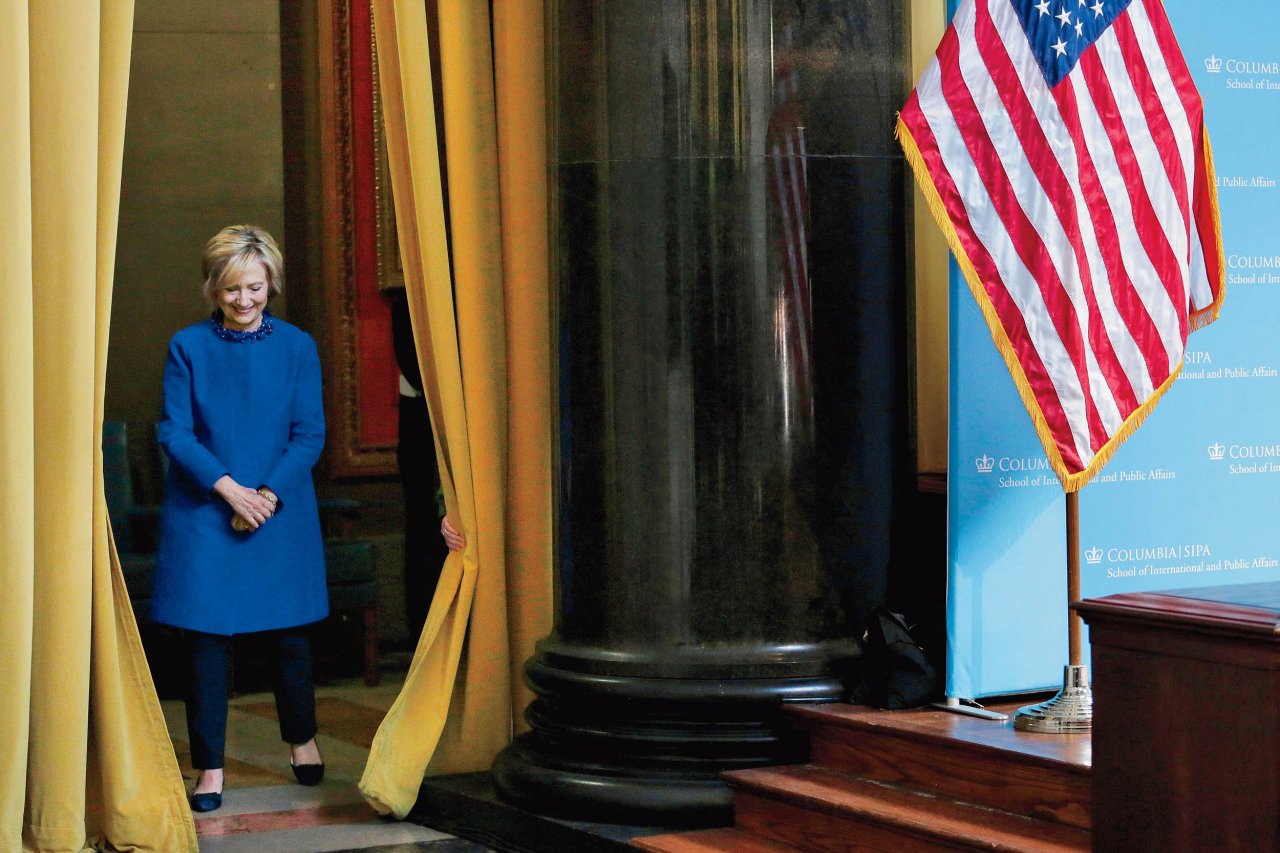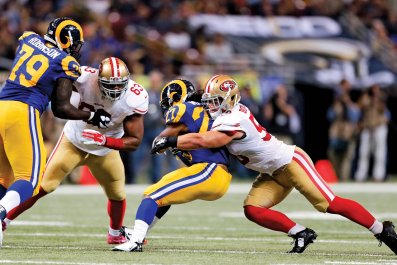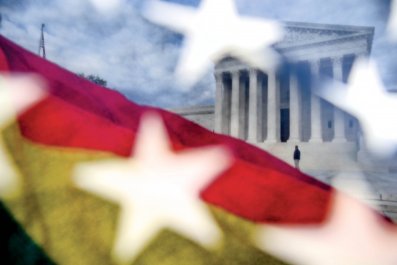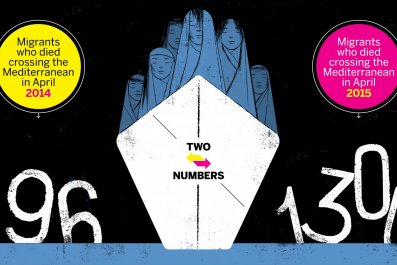Spouses contradict each other all the time in public, but it's pretty rare when one of them has been president of the United States and the other is making a run for the White House. That's what happened in late April as the Baltimore riots raged and Hillary Clinton called for an end of the "era of mass incarceration" that has led to so many African-American men behind bars. She did not mention her husband, Bill Clinton, who while president signed a 1994 law that toughened drug sentences, built more prisons and encouraged states to do the same.
The press portrayed Hillary's speech as a calculated move to the left by a front-runner eager to thwart challengers like independent Vermont Senator Bernie Sanders, who entered the Democratic race the next day. But Hillary's pivot is part of a larger shift in American politics away from the principles that guided both her husband and George W. Bush. As different as they were, the two presidents tried to distance their parties from policies that seemed ineffective and unpopular. Each enacted laws that made his base uncomfortable, whether it was Bill's welfare reform or George W.'s expansion of Medicare. As 2016 approaches, the way Hillary and W.'s brother Jeb handle their family legacies could determine whether either of them wins their party's nomination and winds up in the White House. As William Galston, a key architect of the New Democrat agenda in the 1990s, put it: "A party that can't adapt to new circumstances is doomed to irrelevance."
After the disastrous wars in Iraq and Afghanistan, it's hard to remember that George W. tried to rebrand the Republican Party when he came to the White House. His "compassionate conservatism" was dismissed by many Democrats as a way to spin the same old policies that helped the rich and hurt the poor. His tax cuts did disproportionately benefit the wealthy, but his other efforts were a break from the past. George W. took shots at the House Republican leadership in his 2000 campaign, saying: "I don't think they ought to balance the budget on the backs of the poor." In office, he was never a budget slasher. He broke with his party on education. His No Child Left Behind Act dramatically expanded the power of the Department of Education at a time when many Republicans wanted to shut it down. George W. increased aid to Africa and enacted the largest expansion of Medicare since Lyndon Johnson—the creation of a prescription drug benefit, which transformed a system that paid for surgery but not for statins. He also favored comprehensive immigration reform, which the majority of Republicans still oppose.

As a "new Democrat," Bill Clinton challenged his party's orthodoxy too. During the 1992 presidential election, the Arkansas governor's campaign reflected what he'd learned as a liberal in a Southern state during the 1980s: To get white working-class voters to listen to your ideas about expanding government, you had to be fiscally prudent and tough on crime. In the end, police unions endorsed Bill, in part because he supported the death penalty and favored putting more than 100,000 new cops on the streets. President Clinton vowed "to end welfare as we know it," and did so with Republican votes. He won passage of the North American Free Trade Agreement over the objections of a majority of his party. He slashed the deficit and helped redefine liberalism for the modern age, just as George W. later tried to do with conservatism. Each was reelected for a second term in the White House.
But by the time Bill left office in 2001 and George W. in 2009, their own parties had turned on them. What stymied their agendas is a story of failed ideologies, internecine squabbling and a larger tableau of demographic shifts. Some of President Clinton's policies, for instance, were swept away by social change that was unimaginable in the 1990s. Take the Defense of Marriage Act (DOMA). When he put his signature on it, gay rights groups criticized him, but most progressives gave him a pass. Then-Senator Paul Wellstone (D-Minn.), the Bernie Sanders of his day, voted for the measure, which barred same-sex couples from being recognized as spouses under federal law. President Barack Obama's Justice Department fought vociferously against DOMA, and in 2013, the Supreme Court overturned it. The Clintons supported the court's decision, as did the Democratic Party.
Since Hillary's crime speech, the press has implied she's a hypocrite for distancing herself from parts of her husband's legacy. But that's not quite fair. Yes, she's recalibrated her position, but so have many Republicans. Since the 1990s, the prison population has swelled to the point that many in both parties believe that high incarceration rates have become destructive.
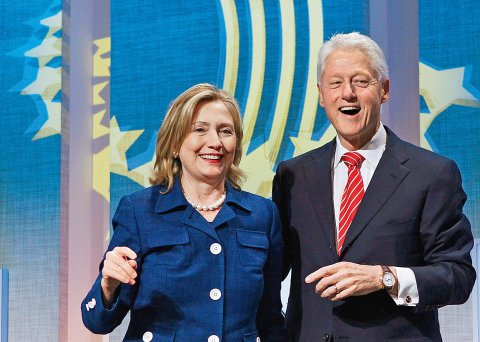
Shifting demographics have also altered the political landscape for Hillary. White working-class voters, once the backbone of the Democratic coalition, have defected in large numbers to the Republicans on issues like gun control and immigration. When President Clinton was elected in 1992, non-college-educated whites made up 60 percent of self-identified Democrats, according to the Pew Research Center. By 2014, that figure had fallen to 35 percent. The Democratic Party of the 21st century is composed of what the writer Ron Brownstein has called the "coalition of the ascendant"—blacks, Latinos and other minorities, affluent voters and those with liberal social values. Hillary's opening campaign video reached out to this new voting bloc. It features two gay couples—one male, one female—and plenty of minorities. There are no cops, no gun owners and nothing overtly religious. And it's not just symbolism. If elected, Hillary has signaled she will almost certainly continue Obama's aggressive environmental policies, which have gone far beyond those of her husband. That's essential for her to appeal to her liberal, green-leaning base, but it'll present challenges for her in states with large numbers of working-class whites, such as Ohio.
On the Republican side, George W. is treated by most of the 2016 candidates as the god best forgotten. No one boasts about his calamitous legacy in Iraq. No one talks up "compassionate conservatism." The Tea Party, which drew national attention shortly after Obama's first inauguration, had its roots in opposition to George W.'s big spending as much as Obama's expansion of government. Even the Patriot Act, which was enacted with overwhelming support during George W.'s first term, is facing criticism from Republicans, including Kentucky Senator Rand Paul and Texas Senator Ted Cruz. So it's no wonder George W.'s ideology is finding little traction.
In today's, older, more conservative Republican Party, expanding the Department of Education or letting illegal immigrants become citizens isn't an easy sell. The problem for Republicans is that an overwhelmingly white coalition can't win you the presidency in a country where the percentage of the white electorate has dropped from 88 percent when Ronald Reagan was elected in 1980 to 72 percent in 2012.

So where does that leave Jeb? The former Florida governor continues to support some of the same positions as his brother, even though he knows they're unpopular on the right. He is defending the idea of a core curriculum—a national set of goals for primary and secondary education. It's not the same as his brother's No Child Left Behind, but it's similar. And on April 30, Jeb told a meeting of the National Review Institute: "I just think you're wrong on immigration." When it comes to government largesse, however, Jeb is rejecting his brother's lavish ways, playing up his opposition to spending bills in Florida, where he was known as "Veto Corleone." When asked about governors being good foreign policy presidents, he cited Ronald Reagan—not his brother. In other words, Jeb is trying to be conservative enough to win the right-and-white Republican primaries, but maintain positions that will allow him to pick up Latinos and white swing voters in the general election.
Hillary has the opposite problem. She needs to satisfy her liberal base and at the same time woo enough white working-class votes to send her back to Washington. Because no matter how much the party's demographics have changed, as Bill's 1992 pollster Stanley Greenberg puts it: "If Democrats cannot figure out how to appeal to today's working-class voters, then they don't deserve to lead."


